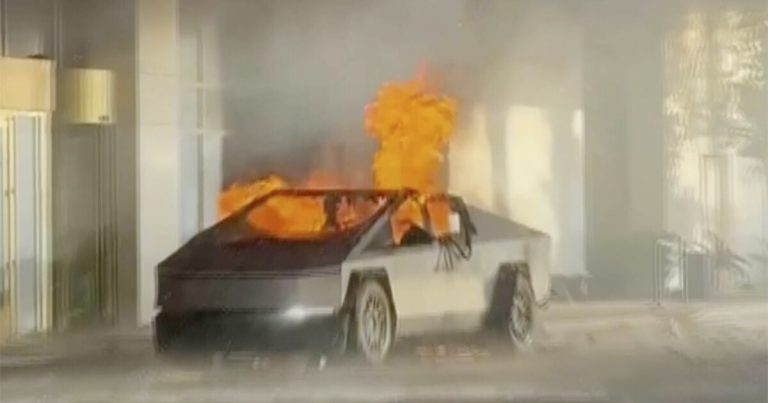As the FBI and Las Vegas police investigate whether Tesla Cybertruck detonation Outside the Trump International Hotel in Las Vegas there was a terrorist attack, investigators aided by the automaker and its vast trove of data on its cars and their drivers.
Video and data from the Tesla charging network allowed investigators to quickly learn where the truck — rented on the car-sharing app Toro — was from the time its alleged driver rented it in Denver on Saturday until until it becomes visible on traffic and private cameras. surveillance feeds that cover Sin City.
RELATED STORY | What is Turo, the app used to rent trucks during the New Orleans attack and Las Vegas explosion?
Just hours after the New Year’s Eve explosion, Las Vegas Sheriff Kevin McMahill was able to speak confidently and in detail about the vehicle’s movements.
“What I can tell you is that we know the truck was rented in Colorado. We were able to trace this truck through Tesla charging stations,” he said Wednesday.
That’s a huge advantage for investigators, former prosecutor John Bandler told Scripps News.
“So if we think about older crimes involving gasoline-powered automobiles, we might look to see where someone filled their vehicle with gas, because we know those cars need gasoline,” Bandler said. “But it’s harder to figure that out because you have to hope they paid with a credit or debit card, and you can get those documents. It’s a multi-step process.”
“Here with the Tesla, you know, it has to be charged at a Tesla station,” he added. “You go to Tesla and ask them, ‘Can you tell us everything you can about this car?’ When was it loaded? When did it ride? Where did it drive?’ Because Tesla knows where its cars are,” he said.
RELATED STORY | Suspect in Las Vegas cybertruck explosion was member of Army Green Berets
An expert in cybercrime and online law, Bandler said demands for digital data from phone companies, device makers, social media platforms and – yes – automakers are now an important first step for investigators in major cases.
“There is more data being created, collected and stored than ever before,” he said. “That means law enforcement, in theory, can access more data than they ever have before. I mean, the amount of data being collected is astronomical.”
However, despite the benefits for law enforcement, Bandler said a broader question remains whether data is collected, stored and used in a way that respects and protects people’s privacy.
“I think for people who commit crimes or intend to commit crimes, it would be good if they knew that evidence is being created all the time, and we want to hope that law enforcement will obtain that evidence ” Bandler said. “For law-abiding citizens and residents, we have legitimate concerns about our privacy and whether and how private companies use and access it, whether and how the government could access it for any reason. So, for law-abiding citizens, privacy is a legitimate concern. We want to hope that organizations respect the privacy policy they publish.


